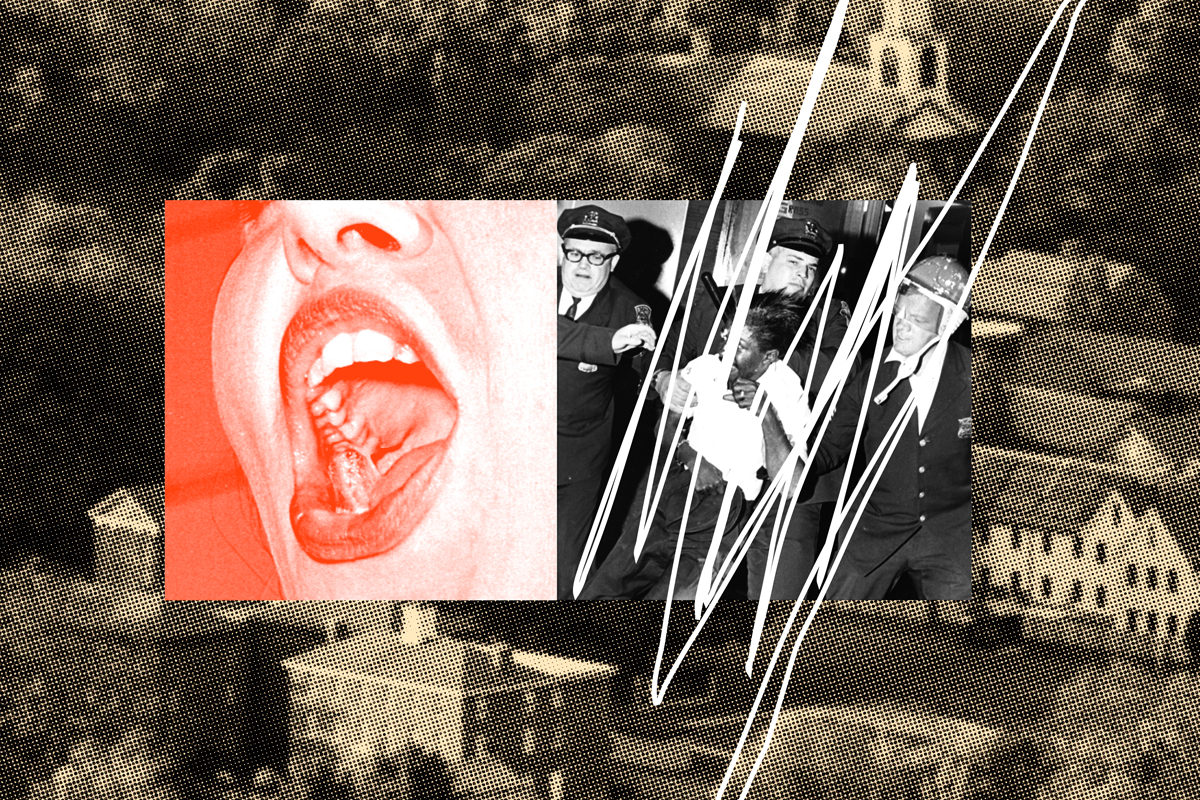Last spring, taking a break from waging conspiratorial campaigns against the republic, an assortment of luminaries associated with the Claremont Institute gathered to lay out a plan to foment a culture war against the nation’s schools. The Clubhouse event, entitled “Building A New Right: Red States vs. Wokeness,” featured a grab bag of Claremont fellows and friends. The star attraction was Manhattan Institute agitprop specialist Christopher Rufo, chief sower of the panics against critical race theory (CRT) and “grooming.”
In a now familiar exercise, Rufo sketched out his campaign to make CRT toxic as part of a larger propaganda war against public institutions. The ultimate goal, he explained, was essentially to do away with those institutions and redirect school funding to families and individuals based on their “values.” Rufo waxed apocalyptic about the scourge of “wokeness,” and yet he struck a hopeful note. After all, he reminded listeners, it had only taken the country a few years to go from the Black Panthers to Nixon.
In the ensuing months, Rufo’s propaganda campaign would grow increasingly lurid, but on this occasion, he urged his audience to raise the discussion to a higher level. Focus on “excellence,” he admonished them, and attack public schools for failing to meet that standard. Conservative communications guru David Reaboi, who helped seed a previous moral panic on the right against the sinister spread of Sharia law, weighed in with some messaging advice of his own: Go full bore against the teachers unions. Do damage.
Today, this coordinated plan to wage a public relations war against the nation’s public schools is an undeniable success. Forty-two states have moved to restrict teaching about oppression, race or gender. According to one estimate, more than one third of students in the country attend school in a state where educators are now subject to some kind of classroom gag order.
The achievement of Rufo and his allies is all the more astonishing, given the deep unpopularity of the policies they champion. Polls consistently show that voters across party lines are repelled by the GOP’s education extremism. Across the chasm of our current political divide, bipartisan majorities are largely in agreement that banning books and gagging teachers is bad.
And for all of the insurgent right’s bold rhetoric about mining parent outrage for electoral gold, the polls that matter most have shown remarkably poor results for candidates running on scorched-earth education platforms. In New Hampshire, New York, Montana, Georgia, Wisconsin and beyond, voters are rejecting right-wing culture warriors, often by wide margins—a movement that might be summed up as “keeping the crazy away from the kids.”
There’s just one problem, though: The leadership of the Democratic party doesn’t seem to have gotten the memo.
Democrats Must Defeat the Left’s War on School Achievement blared New York magazine writer Jonathan Chait in a column this spring. Christopher Rufo seems to have largely abandoned his “higher level” strategy, jettisoning appeals to excellence in favor of unhinged talk of trans strippers—but Democratic thinkers and strategists have eagerly picked up the slack. In their preferred narrative of rampant educational decline, schools and the Democratic Party are under assault from the education equivalent of the Squad: a cabal of woke unionists and graduate professors of education. In an interview with an education news site this spring, Chait warned that schools risked falling into the thrall of just the sort of far-left ideology that Rufo and his followers were savaging. “Schools are an area where the Left can operationalize policies that can’t really pass democratic muster,” he sternly announced, “and it makes education a danger zone for Democrats.”
Polls consistently show that voters across party lines are repelled by the GOP’s education extremism. But the leadership of the Democratic party doesn’t seem to have gotten the memo.
Chait, a longtime mouthpiece for the Democrats’ education reform wing, has been among the most vocal school alarmists among centrist pundits. But he has plenty of company among well-placed opinion writers prone to detect political disaster in the work of teachers unions and their allies. “There are a lot of ideas about ‘equity’ in education that are popular at education schools but way out of step with the public,” fretted Josh Barro recently, urging Democrats to run away from education equity initiatives the way they’d run away from earlier appeals to defund the police. Matt Yglesias waxed nostalgic for the days of the Bush-Obama consensus on education reform “excellence”—that halcyon time before education schools and unions agreed that “measuring learning is racist.”
Never mind that polls show that parents, by wide margins and irrespective of political affiliation, express satisfaction with their children’s schools and what’s being taught in them. No, the pundit chorus agrees that if the Democrats are to avoid a slaughter in the coming midterm cycle, the correct course is to embrace the messaging of the Manhattan Institute, the Claremont Institute and other right-wing foes of public education: go full bore at the ed schools and the teachers unions. “If Democrats care about social mobility and winning elections,” Chait warned, “they need to recognize that an important faction within their own party has a program that is inimical to both goals and fight as hard as they can to keep them out of power.”
If these prophecies of doom sound familiar, that’s because they’re warmed-over versions of early Covid-era warnings from the same centrist pundits that pandemic school closures, backed by teachers unions, would likely spell electoral disaster for Democrats. But here too, the ed reform advocates have consistently marched out of step with public opinion. Poll after poll showed that schools largely responded to the concerns of parents. Indeed, charter schools, which are overwhelmingly non-union, were actually more likely to remain closed than their district counterparts. In his interview with the education news site The 74, Chait professed to be channeling sentiments on the right as he suggested that school closures represented an opportunity to split Democratic voters from teachers unions. But his recommended solution is the same one that centrist Democrats have been pursuing for more than three decades: get there first.
The war on America’s “education establishment” is nearly as old as the nation itself. Smearing schools of education has been a sport since the early nineteenth century. The attacks on teachers unions are of a more recent vintage. In her new book Left Behind, historian Lily Geismer tells the story of how the Clinton-era Dems took aim at unions as part of an effort to distance the party from its New Deal days. As wages stagnated and inequality widened, Clinton and his team of New Democrats proffered a solution that stressed the fine tuning of school performance rather than the redistributive politics of the past. The answer to rising crime, ballooning welfare rolls and social division, recalled Clinton in a 1998 speech, was “educational excellence”: preparing the nation’s youth for the information age and an economy fueled by ideas.
As Geismer details, this strategic retreat from redistributionist policy agendas was part of a larger bid to redefine the Democrats’ electoral base. Knowledge workers and white suburban dwellers were in, organized labor and the Black working class were out. One key aim of this reorientation campaign was to weaken the grip of “special interests” over the party: organizations pushing for expanded civil and women’s rights, environmental groups, and unions—especially teachers unions.
Charter schools, along with welfare reform, would be key to winning over white moderate suburbanites. This was the message crafted by Al From, founder and head of the centrist Democratic Leadership Council, who urged it in turn on the DLC’s former president, Bill Clinton. When Clinton mounted his successful presidential run in 1992, he championed the overlapping gospels charter school “innovation” and welfare reform to demonstrate to centrist white suburbanites that he was not beholden to the party’s inherited New Deal orthodoxy and its power centers. By 1996, Clinton was proclaiming an end to the era of big government and a new day for the nation’s public schools, one in which teachers could form new schools “with a charter they can keep only if they do a good job.”
The results of the party’s swoon for free-market solutions to poverty can be summed up in the subtitle of Geismer’s book: “How the Democrats Failed to Solve Inequality.” Micro-enterprise partnerships between government and the private sector, on the model of the charter-school movement, would prove no match for entrenched poverty and segregation. And the Democrats’ attachment to free-market orthodoxy prevented the party from pursuing more ambitious and redistributive policies.
However, the New Democrats’ vision was successful in one key respect: Democratic strategists steadily weakened the grip of unions in the cause of pursuing moderate voters and Silicon Valley funders. The era of bashing teachers and their unions in the name of “education excellence” was officially under way.
Earlier this year, when Mallory McMorrow, a telegenic young Michigan state senator, went on offense against a Republican colleague who, in a fundraising pitch, accused her of being a “groomer,” she was hailed as a model for how Democrats should respond to GOP culture war assaults. This is how it’s done, one pundit after another announced. Even James Carville, a tireless crusader against “woke” excesses among Democrats, proclaimed McMorrow’s speech a master class.
For New Democrats, knowledge workers and white suburban dwellers were in, organized labor and the Black working class were out.
But lost in all of the gushing over McMorrow’s performance was some key context. The Republican who smeared her was running the Rufo playbook: accusing supporters of public education as grooming and sexualizing children in order to create an atmosphere of “universal public school distrust,” as Rufo put it in a speech at Michigan’s Hillsdale College this spring. Lana Theis, the chair of Michigan’s Senate Education and Career Readiness Committee, is pushing a controversial $500 million private school voucher program.
McMorrow is an outspoken opponent of the voucher plan. That’s because school choice has long been a right-wing cause in Michigan. And voters there know that this campaign is less about “excellence” than kneecapping teachers unions as a means of undermining the Democratic party. Theis’ language may have been newly shocking, but the cause she is peddling is an old one. The DeVos family, who are among the GOP’s deepest-pocketed donors, has been trying to bring school vouchers to the state for decades.
So far, following the Rufo road has yielded few tangible returns for the GOP in Michigan. Even branding opponents of school vouchers as groomers hasn’t been enough to overcome the scheme’s unpopularity. Meanwhile, the party’s increasingly unhinged rhetoric around schools is only alienating voters in suburbs that had already been trending blue. If Democrats indeed take back the Senate in Michigan come November—a distinct possibility in what pollsters say may be the party’s only chance to flip a state house chamber–they should send a thank you card to Christopher Rufo.
Michigan isn’t the only state where the GOP’s education extremism presents an opportunity for Democrats. In Pennsylvania, Christian nationalist gubernatorial candidate Doug Mastriano has made dismantling the state’s public schools a central part of his campaign. Mastriano wants to slash school spending in half and then give what’s left directly to parents. “They can decide which school to go to, public school, private school, religious school, cyber school or home school,” he said in a recent radio interview.
The move, which Mastriano is peddling as a means of drastically reducing the state’s property tax, would have the effect of decimating public education in Pennsylvania. But capping expenditures far below what the state’s current outlays for schools would also shift much of the burden of paying for education onto parents themselves. Parents who already send their kids to private schools would get a subsidy under Mastriano’s plan. But parents of public school kids—the vast majority in the state—who hope to provide their kids with anything more than a bare-bones education will have to pick up the rest of the tab themselves.
If it sounds like a losing political message, that’s because it is. A similar effort led by libertarians in New Hampshire this spring spurred a bipartisan citizens’ revolt. And as Philadelphia Inquirer columnist Will Bunch recently pointed out, Pennsylvania voters previously rebelled against a far less radical plan, tossing out GOP Governor Tom Corbett after school spending cuts resulted in teacher layoffs and swelling class sizes.
Still, despite these clear signals of robust support for quality public schools across the political landscape, it’s not clear that Democrats even remember how to defend public education. The issue that has most animated the centrist wing of the party this spring isn’t the GOP’s debased culture war attacks; no, it’s a battery of proposed reforms to the $440 million federal Charter School Program, started by Bill Clinton in 1995. The Biden administration’s pledge to toughen oversight of the program set off a firestorm within the party’s education reform wing. Michael Bloomberg, who announced last year that he’ll be spending $750 million to expand charter schools because “American public education is broken,” penned a typical fire-breathing denunciation. Republicans, Bloomberg warned, are making inroads with voters by appealing to parents and painting Democrats as captives of teachers unions.
Prominent Democratic education reformer Andrew Rotherham, who recently joined Glenn Youngkin’s education team, went further, portraying the charter battle as a battle for the soul of the Democratic party—indeed, the same fight that’s been playing out in the party for the past four decades. “It’s producers versus consumers, special interests against reformers, deregulation, all the big ones,” Rotherham explained.
Republicans seem to think that Rufo’s message of “laying siege to the institution” will rally voters in the midterms and beyond. And so far, many Democrats seem determined to prove them right.
Jennifer C. Berkshire hosts the education podcast Have You Heard. She is the author, with Jack Schneider, of A Wolf at the Schoolhouse Door.



